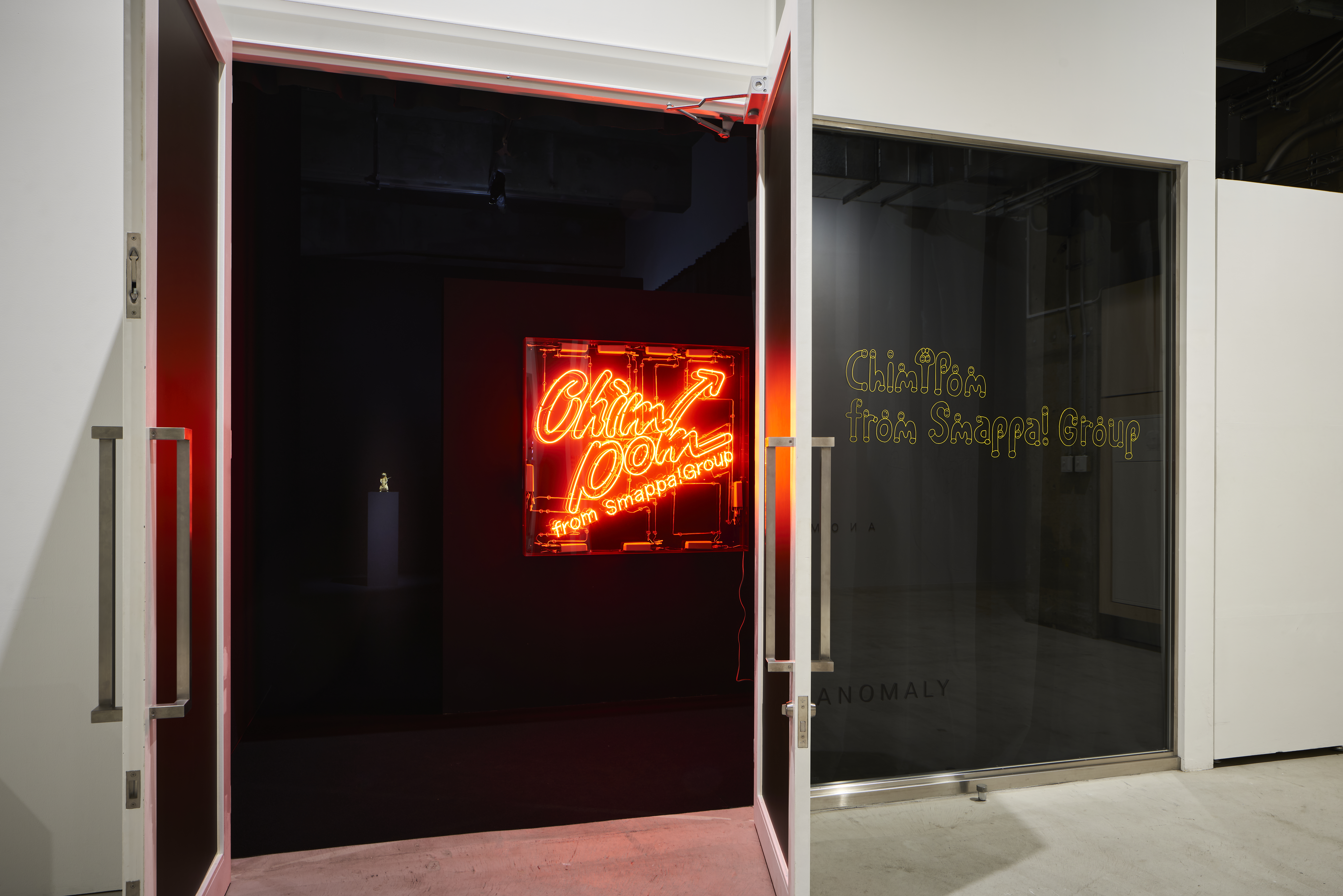- ---
Project Index -
BENTEN 2024BENTEN 2024 2024
ナラッキーNa-Lucky 2023
DOBUROKGEOLLIDOBUROKGEOLLI 2022
いつのことだか思いだしてごらんいつのことだか思いだしてごらん 2022
改名Name Change 2022
くらいんぐみゅーじあむCrying Museum 2022
SUNSUN 2022
はい、こんにちは Hello There 2020
May, 2020, TokyoMay, 2020, Tokyo 2020
A Drunk PandemicA Drunk Pandemic 2019
にんげんレストランNingen restaurant 2018
道Street 2017-
The other side 2017
Scrap & Build 2 2017
Scrap & Build 2016
Don't Follow The Wind initiated by Chim↑Pom 2015-
堪え難きを耐え↑忍び難きを忍ぶ10th ANNIVERSARY EXHIBITION 2015
金三昧KANE-ZANMAI 2014-
パラドックスPARADOX 2014
LOVE IS OVER 2014
マッドエリイMAD ELLIE 2013-
GARBAGE 2012-
PAVILION 2012-
REAL TIMES 2011
パズルPUZZLE 2011,2014-
IMAGINEIMAGINE 2010
BLACK OF DEATH 2008,2013
広島HIROSHIMA 2008-
日本のアートは10年おくれている 世界のアートは7,8年おくれているJAPANESE ART IS 10 YEARS BEHIND, AND ART OF THE WORLD IS 7 OR 8 YEARS BEHIND. 2008
友情か友喰いか友倒れかBecoming Friends, Eating Each Other or Falling Down Together 2008
TPA 2007
サンキューセレブプロジェクト・アイムボカンTHANK YOU CELEB PROJECT "I'M BOKAN" 2007
ともだちTOMODACHI 2007
オレオレORE-ORE 2007
エロキテルEROKITEL 2007-
スーパーラットSUPER RAT 2006-
BODY 2005-
- ---
Overview open -
改名のお知らせ
この度Chim↑Pomは、2022年4月27日をもちまして、Chim↑Pom from Smappa!Groupへと改名致します。当面はこの名称で活動いたしますので、皆さまにはご周知頂き、今後ともご愛顧賜りますよう宜しくお願い申し上げます。
ことの経緯は、森美術館で開催中の「ハッピースプリング」展での設営費などを賄うために美術館から協力要請を受け、一部作家側で集めることとなった約1000万円の協賛金に端を発しております。私どもからいくつかの企業にお声がけさせて頂いたうち、Smappa!Groupからのお申し出だけが美術館からお断りされました。
互いに話し合い解決策を模索して参りましたが、先方は「六本木ヒルズという『まちづくり』における『ブランディング』」だと理由を説明し、「森美術館はヒルズという『文化都市』の顔である」と、接客を伴う水商売の会社のロゴは掲載しないと今月改めて回答がありました。
私どもはこれまで、Smappa!Groupとの協働において、「LOVE IS OVER」や、スクラップアンドビルドプロジェクト「また明日も観てくれるかな?」展、そして「にんげんレストラン」など、代表的なプロジェクトを生み出して参りました。
Chim↑Pomの個展は主催するがSmappa!Groupの協賛はNGとする。これを、アートによる「多様性」と取るか「『多様性』の搾取」と取るかは、議論が必要かと存じます。
今後、Chim↑Pomとのお付き合いを望まれる全ての団体におかれましては、私どもが際どい社会人であることを改めてお見知りおき頂き、間違ってもただの「健全」なグループだと勘違いなされませんよう、深くお願い申し上げます。
改名に際し、森美術館には「ハッピースプリング」展において以下2点をご対応頂きたいと願う所存です。
ただし、ゴールデンウィークは美術館の担当各所にも充分にお休み頂きたいので、期日は5月15日までとさせて頂きます。
1. Chim↑Pom from Smappa!Groupを正式名称として、全ての媒体や広報物において使用を徹底して頂くこと
2. 引き続き、Smappa!Groupの協賛金受け取りとロゴの掲載をご検討頂くこと
_____
Smappa!Groupは新宿歌舞伎町で18年の歴史を持つ、ホストクラブやギャラリー兼バー「デカメロン」、歌舞伎町初の書店であった旧「歌舞伎町ブックセンター」の他、飲食店や介護施設、美容室などを手掛ける企業です。
皆さまご存じの通り、エリイの夫、手塚マキが会長を務め、「ホストとして、社会人として」生きることをモットーに、街のゴミ拾いや地元の祭りや行事などに積極的に参加し、手塚自身も歌舞伎町商店街振興組合の常任理事として街の治安向上に努めています。コロナ禍で歌舞伎町が「夜の街」と名指しされた際には、吉住健一新宿区長とともにコロナ対策の前線で指揮を取りました。
法的な見地はさておき、森美術館の対応を職業差別だと見る向きもあります。特にSmappa!Groupはこのような風潮と向き合い続けてきた会社です。
手塚は朝日新聞(2022/3/5)のインタビューにて、「結局、同業の多くが隠れるために、別会社をつくる。私はそれをしません。堂々と胸を張れる企業でいたいと思うからです。」と語り、その為に業界の悪習と、自らの意思でホストクラブに来る殆どの女性客を受動的な被害者のように見なす世間の目の両方に異を呈しています。
Chim↑Pomとしてはこの件を、クリエイティブ産業が街から「猥雑」なものを十把一絡げに職種や属性により排除する「旧来のジェントリフィケーション」の典型だとも捉えております。
ジェントリフィケーションにも善し悪しの議論があるのは承知の上ですが、その動きをリードした「クリエイティブ都市論」自体の見直しが議論される昨今、時代の変化に美術館が適応するのは当然のことと考えております。
社会全体が、その多様性を謳う(特に森美術館はそのような趣旨をアナウンスしていると思いますが)一方で、実態としては公共性よりもブランディングを優先し、いざ自身の問題として直面すると排除する、という常套手段がまかり通ることに対しての違和感をここに強く示す所存で御座います。
もちろん、いわゆる武器商人のような会社との関わりは私どもも業種からして有り得ませんが、基本的にChim↑Pomは、お付き合いの判断は属性如何よりも其々の会社や個人として考えて参りました。
森美術館もその例外では御座いません。
私どもは六本木ヒルズとともに生き、同時に夜の街とも生きるという公共性にこそ、アートのダイナミズムがあると信じております。
______
美術館のスタッフが、これらの対策はじめ、インスタレーションの実現や「道」の運営のサポートに、全力で取り組もうと努力下さったことには、先んじて感謝の意を表したいと思っております。
ただ、私どもは、今回のSmappa!Groupの件と、スーパーラットの館内での展示不可は根は同様のケースだと考えております。
彼ら彼女らが、会社と掛け合い続けてきた経緯を間近に見て参りましたので、ことを荒立てるつもりは御座いませんでした。それでも、スーパーラットが美術館から共同プロジェクトスペースに出されたことで、「表現の自由」に議論の余地が大きく生まれてしまったこと、また上述のSmappa!Groupの件と排除が続いた事の重大さを鑑みて、水面下での交渉に限界を感じた次第です。
つきましては、「ハッピースプリング」展をより面白く意義あるものに発展させる展覧会「Chim↑Pom from Smappa!Group」を、4月27日より「ANOMALY」で開催致します。
起きてしまったことは問題だと考えておりますが、せっかくならばこれを新たなプロジェクトを制作する為の森美術館の思わぬキュレーションだと思い、緊急では御座いますが新作を皆様に披露させて頂きます。
また、同時開催として、4月30日からは「無人島プロダクション」でも一風変わった回顧展「いつのことだか思い出してごらん」を開催致します。
皆様におかれましては、新緑の候、ゴールデンウィークなどをお楽しみのついでにどうぞお足をお運び頂き、Chim↑Pomの一旦の最後と、Chim↑Pom from Smappa!Groupのはじまりをご高覧頂けますよう、何卒宜しくお願い申し上げます。
2022年 Chim↑Pom from Smappa!Group
Notice of a change of name
We will be changing our name from “Chim↑Pom” to “Chim↑Pom from Smappa!Group” effective April 27, 2022. We will remain active under this new name for the foreseeable future, and ask for your mindfulness of this change and your continued interest in our activities.
This change came about in connection with sponsorship funds, part of which we collected in response to a request from Mori Art Museum to defray the cost of installation and other items for Happy Spring, our exhibition that is now being held there. While several companies agreed to provide funding, the offer by Smappa!Group, a business in the nightlife district of Tokyo, was the only one to be rejected by the museum.
In the past, we have collaborated with Smappa!Group in putting together some of our signature projects, including LOVE IS OVER, the scrap-and-build project So see you again tomorrow, too?, and Ningen Restaurant.
We engaged in discussions with the museum in an attempt to find a solution. In these discussions, we were told that the reason for the refusal was “branding” in the context of the “community development” represented by Roppongi Hills, and that Mori Art Museum was the very face of the Hills area as a “cultural city.” This month, we again received a reply to the effect that the museum would not display the logo of a company that was in the nightlife business.
The museum said that it would host a solo exhibition by Chim↑Pom but rejected sponsorship by Smappa!Group. In our opinion, the question of whether this exhibition is showcasing or exploiting artistic diversity is a matter that requires further discussion.
We earnestly ask all groups desiring some involvement with Chim↑Pom to be aware that we are provocateurs, and to never entertain the mistaken idea that we are a wholesome bunch.
With this change of name, we are requesting Mori Art Museum to take the following two steps in this regard, beginning on May 15 (as we would genuinely like to provide ample time for enjoyment of the Golden Week holiday by the concerned Museum personnel as well).
1. To switch to “Chim↑Pom from Smappa!Group” as our official name, and to make sure to use this name in all media and press releases.
2. To reconsider the acceptance of funds from Smappa!Group and display of its logo.
______
Established 18 years ago in Shinjuku’s Kabukicho district, Smappa!Group is a company that owns many establishments, including host clubs, restaurants, care facilities, beauty salons, the gallery and bar Decameron, and formerly the Kabukicho Book Center, the first bookstore in the area.
Maki Tezuka, the president of Smappa!Group, is partners with Ellie, one of Chim↑Pom’s members. Under the ethos of “living as a host and as a member of society,” his company has actively participated in city clean-up initiatives, local festivals, and events. Tezuka also serves as a full-time director of the Kabuki-cho Shopping Center Promotion Union and is working to improve the public safety in the district. When the area came under scrutiny as a nightlife zone suspected of exacerbating the spread of Covid-19, Tezuka was at the front lines spearheading anti-Covid measures with Kenichi Yoshizumi, the mayor of Shinjuku.
Setting aside the legal standpoint, one might regard Mori Art Museum’s response as discrimination against nightlife workers. Through their public outreach and education initiatives, Smappa!Group is a company that has long fought against such discrimination.
In an interview with Asahi Shimbun on March 5th, 2022, Tezuka explained, “Many people in my line of work create side companies in order to cover their tracks. I do not do that because I want my company to represent itself confidently.” He dismisses both the unhealthy customs of the industry and the common stereotype that views most female customers of host clubs as being coerced into going rather than an understanding that they could patronize the clubs for their own enjoyment.
We also see this issue as a typical example of gentrification, where the creative industry conflates and excludes “indecent” elements from the city based on their occupations.
An idea that ushered in new development was the theory of the creative city. We acknowledge arguments both for and against gentrification, but with current debates that modify this concept, we believe it is only natural for museums to adapt to the changing times.
While society as a whole promotes diversity (Mori Art Museum, in particular, has made such announcements), in reality, branding is prioritized over a sense of publicness. Whenever confronted by issues pertaining to them, institutions will go to great lengths to exclude any inconvenience to their brand. We firmly believe these old ploys should not go unchallenged.
Of course, we would never involve ourselves with an industry like arms dealing, but as a general rule, we base the decision to work with others on the company or individual rather than on other aspects such as their attributes. Mori Art Museum is no exception.
We believe art’s dynamism lies in a publicness that allows for the coexistence of Roppongi Hills and Tokyo's nightlife district, Kabukicho.
______
We see the same logic of exclusion behind this case involving Smappa!Group and the refusal of Mori Art Museum to permit the display of our artwork Super Rat in the museum due to a request by a gaming company that is a tenant of Roppongi Hills. Before going any further, we would like to express our gratitude to the museum staff, who gave us their wholehearted support for our efforts on behalf of sponsorship by the Smappa!Group, as well as for construction of the installation and management of the Street work.
These staff members saw our negotiations with the company for themselves, so we certainly had no intention of aggravating things. Nevertheless, we could not help feeling that the expulsion of Super Rat from the museum to the collaborative project space raised significant concerns regarding “freedom of speech.” Also, in light of the Smappa!Group case and the continued exclusion of Super Rat, we felt we had reached the limits of our behind-the-scenes negotiations.
Beginning on April 27, 2022, the art gallery ANOMALY will be holding an exhibition titled Chim↑Pom from Smappa!Group as a companion exhibition to Mori Art Museum's Happy Spring exhibition in order to make both exhibitions more meaningful. In parallel, we are going to hold another, somewhat bizarre exhibition titled Remember the Days at MUJIN-TO Production beginning on April 30, 2022.
We think what happened is a problem, but also see this unexpected curation by Mori Art Museum as a precious opportunity for creating a new project. While this is a sudden development, we are looking forward to showing the new works that derived from this situation.
As you enjoy yourselves amid the fresh buds of spring and the Golden Week holiday, we fervently hope you will also decide to visit these exhibitions to see the last of “Chim↑Pom” and join us in celebrating the birth of “Chim↑Pom from Smappa!Group”!
- Chim↑Pom from Smappa!Group, 2022
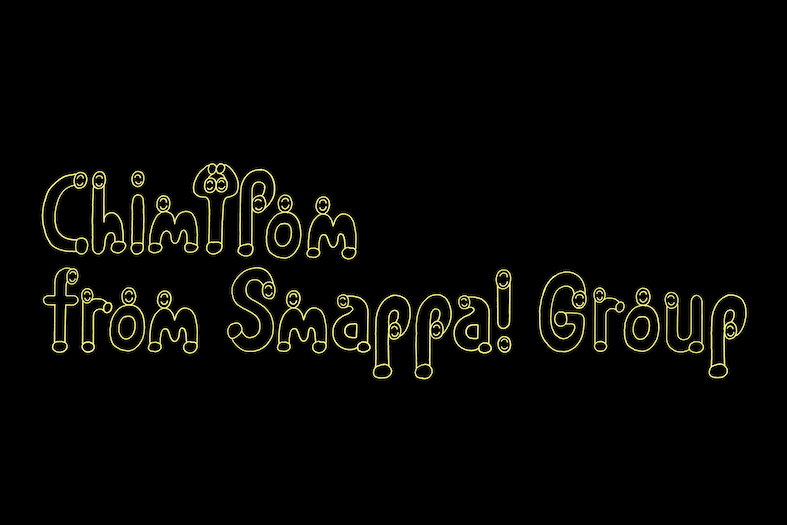
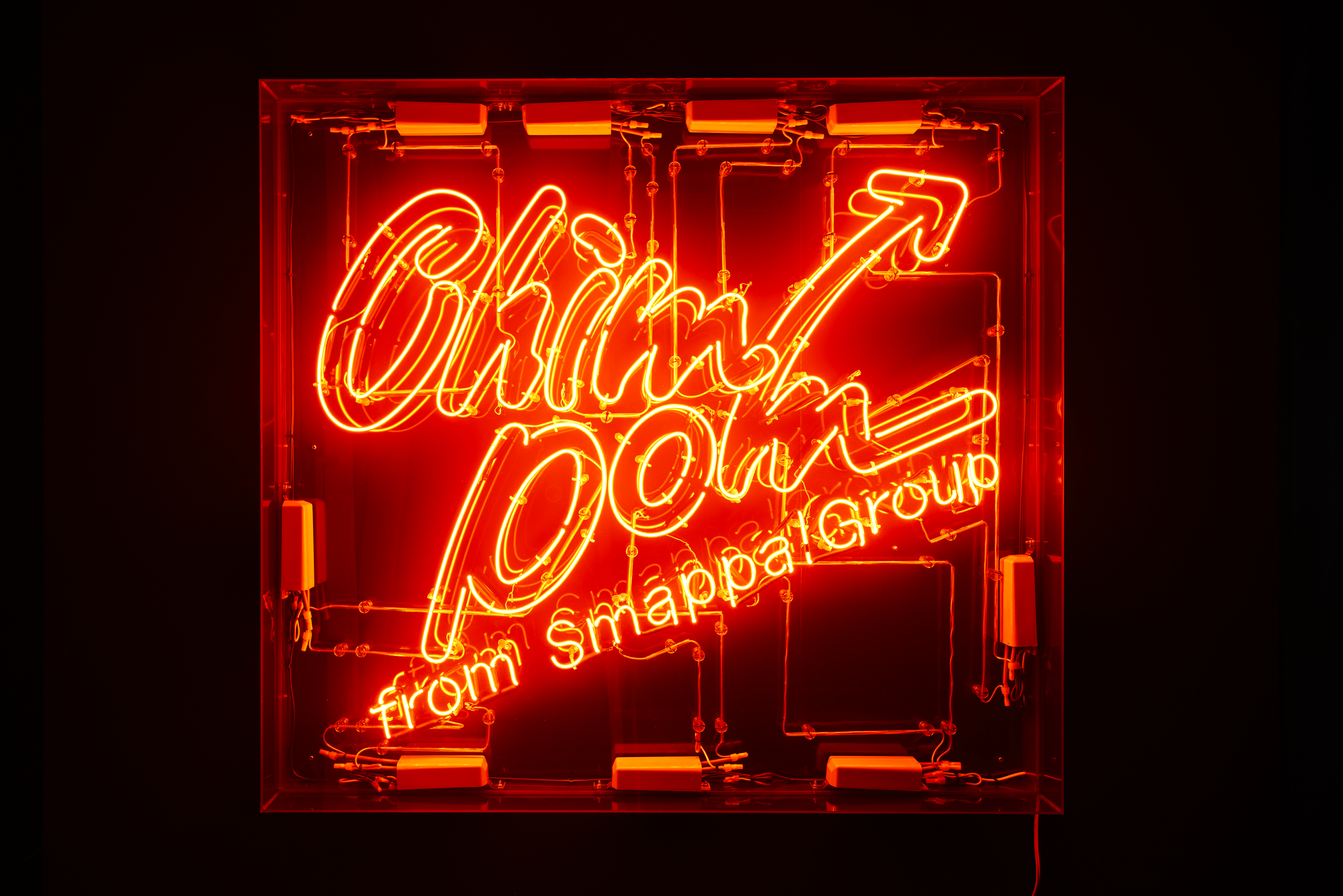
Chim↑Pom from Smappa!GroupChim↑Pom from Smappa!Group
2022 ネオンサイン、120 × 110cm
展示風景:「Chim↑Pom from Smappa!Group」ANOMALY(東京)2022年
ネオン制作:市川大翔、撮影:森田兼次
Courtesy of the artist and ANOMALY2022 Neon sign, 120 × 110cm
Installation view: Chim↑Pom from Smappa!Group, ANOMALY, Tokyo, 2022
Production: Taisho Ichikawa, Photo: Kenji Morita
Courtesy of the artist and ANOMALYChim↑Pom from Smappa!GroupChim↑Pom from Smappa!Group
2022 ネオンサイン、120 × 110cm
展示風景:「Chim↑Pom from Smappa!Group」ANOMALY(東京)2022年
ネオン制作:市川大翔、撮影:森田兼次
Courtesy of the artist and ANOMALY2022 Neon sign, 120 × 110cm
Installation view: Chim↑Pom from Smappa!Group, ANOMALY, Tokyo, 2022
Production: Taisho Ichikawa, Photo: Kenji Morita
Courtesy of the artist and ANOMALY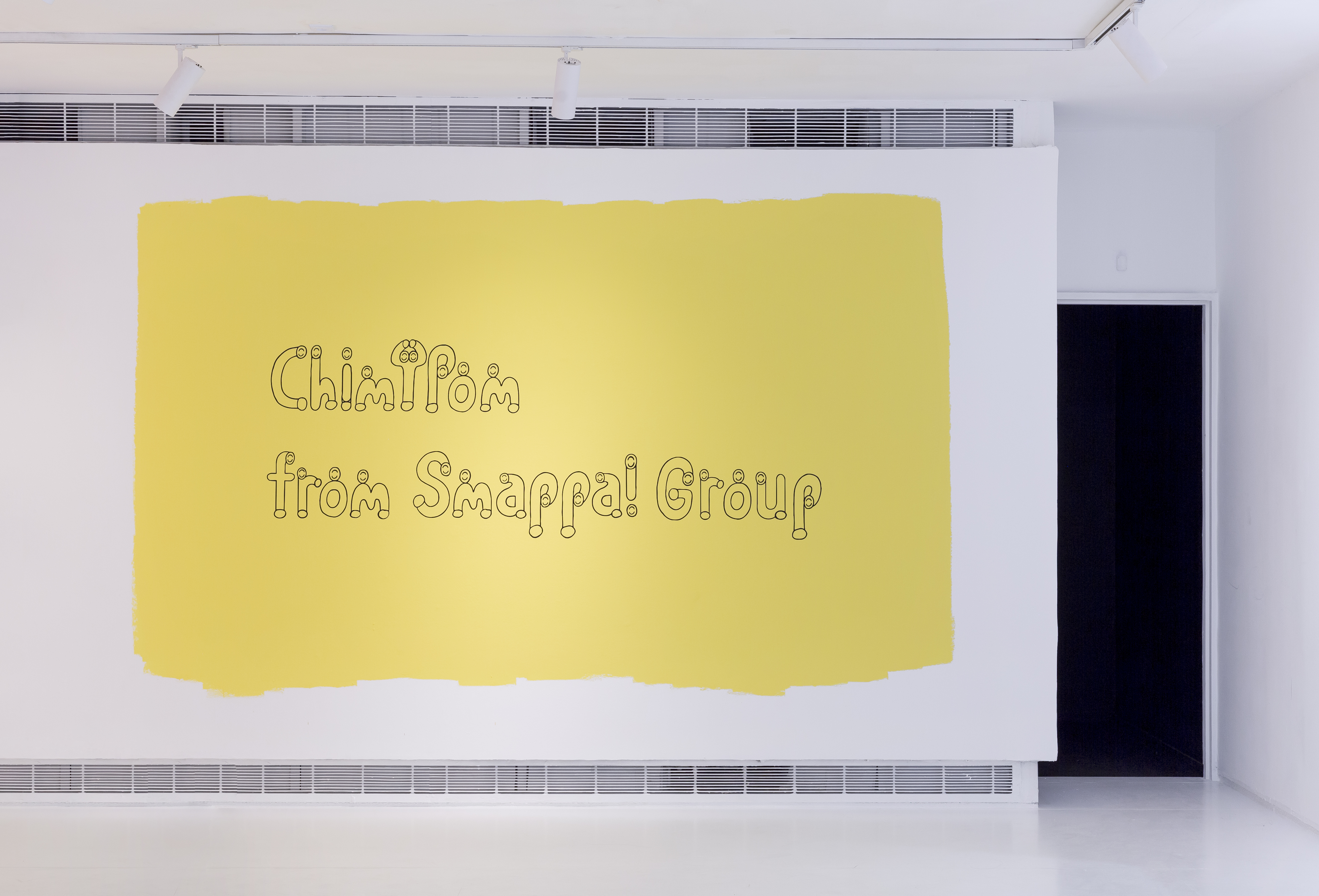
Chim↑Pom from Smappa!GroupChim↑Pom from Smappa!Group
2022
展示風景:「NOT IN MY NAME」CCA Tel Aviv-Yafo(Israel)2022年
撮影:Eyal Agivayev
画像提供:CCA Tel Aviv-Yafo2022
Installation view: Group Exhibition: NOT IN MY NAME, CCA Tel Aviv-Yafo, Israel, 2022
Photo: Eyal Agivayev
Photo courtesy: CCA Tel Aviv-Yafo, Israel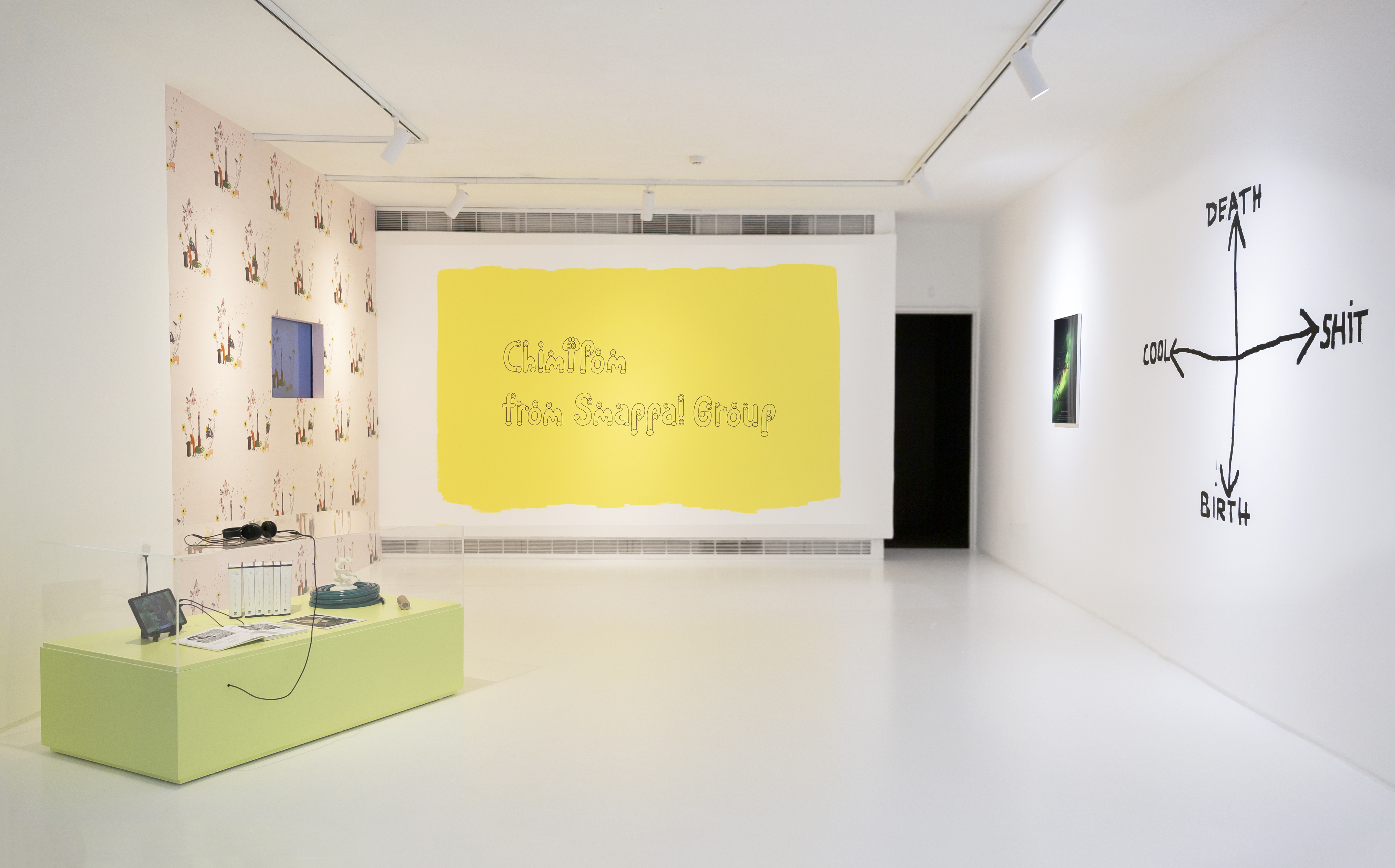
Chim↑Pom from Smappa!GroupChim↑Pom from Smappa!Group
2022
展示風景:「NOT IN MY NAME」CCA Tel Aviv-Yafo(Israel)2022年
撮影:Eyal Agivayev
画像提供:CCA Tel Aviv-Yafo2022
Installation view: Group Exhibition: NOT IN MY NAME, CCA Tel Aviv-Yafo, Israel, 2022
Photo: Eyal Agivayev
Photo courtesy: CCA Tel Aviv-Yafo, Israel

